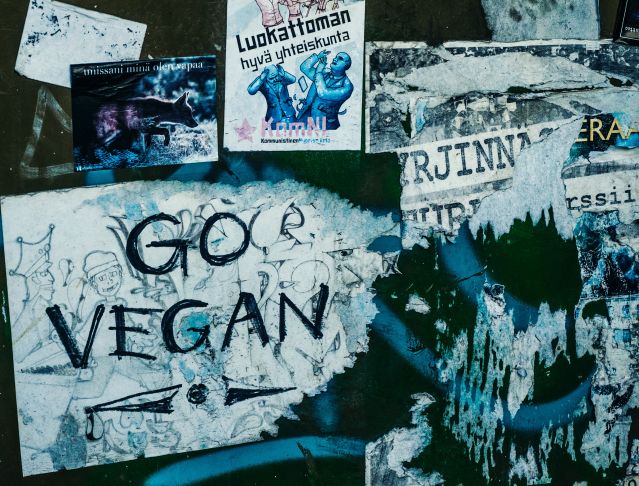Diet
Vegans Suffer From Stigma
Personal Perspective: Why vegans may be considered a marginalized population.
Posted June 29, 2023 Reviewed by Tyler Woods
Key points
- Many people may assume veganism is an easy choice, driven by fashion and fads.
- Veganism often has a foundation deeply rooted in personal ethics and beliefs.
- Vegans are often severely stigmatized and may find themselves rejected by mainstream society.
- Our spiritual and ethical beliefs can be just as powerful as organized religion.
Vegan psychology focuses on the specific psychological needs and stressors of people who identify as vegan, including the psychological effects of the stigmatization of vegan people. For clarification, a person who is vegan does not consume nor use any animal products. Vegans, in general, try to stay away from anything that uses, abuses, or oppresses other animals in order to benefit humans. Often, this includes a plant-based diet and a focus on sustainable practices such as forgoing wool or leather products and instead using alternative materials such as hemp, cotton, or newer materials such as "cactus leather" or "piñatex". Despite public perception, it can be incredibly difficult to be vegan in a society that marginalizes ethical, rather than religious, belief systems such as veganism.

The Vegan Stigma
People who identify as vegan are often severely stigmatized and may find themselves rejected by mainstream society. Despite a rise in vegan-identifying celebrities (Joaquin Phoenix, Woody Harrelson, Jessica Chastain), people often have stereotypical ideas about what a vegan looks like and how a vegan should act. When I asked my class of graduate students who they picture when I say the word "vegan", they said "a young, white woman, a hippie, with great skin who is middle-to-upper class but she is always feeling angry." So, we started breaking down these stereotypes, one by one.
We discussed vegans of color, such as Erykah Badu, Congressman Corey Booker, boxer Mike Tyson, and singer Ne-Yo, and the rise of veganism in Latinx communities. We talked about the different reasons that someone becomes vegan—for the animals, for health, or for the environment. (Methane gas produced from livestock is a notorious contributor to the deterioration of the ozone layer. Some experts suggest that if we eliminate animal agriculture, we may have a chance to reverse climate change). We discussed the economic stereotypes of veganism and discussed that rice and beans, pasta, potatoes, and frozen vegetables are low-cost non-animal products; in fact, in most developing countries people tend to eat a more heavily plant-based diet since meat can be more expensive than growing crops. And we discussed the alleged health benefits of veganism. Although a whole-foods, plant-based diet certainly is healthy, veganism is not in itself healthy, since processed food such as Oreo Cookies and Impossible Burgers may be only slightly healthier than their animal product equivalents.
"Angry Vegans"
Most importantly, we talked about the myth of the "angry vegan". The term "plant-based" is almost more acceptable than "vegan" since the word "vegan" often brings to mind someone with a fervor and ardor for changing public view—usually through aggressive and sometimes militant means. There definitely are some extremist and angry vegans. This is a small subset of people and, although I don’t agree with their approach, I understand why they are extreme. They see injustice in the world and are trying to be strong advocates for change. In my opinion, anger only turns people away and education, compassion, and kindness are stronger motivators for change. The vast majority of vegans promote compassion to all, including other humans, rather than anger. In our modern society, we have learned to not stereotype large groups of people by the actions of a few and yet we continue to judge vegans who just want to enjoy their lentil-based shepherd's pie in peace, based on the behavior of a few extremists.

My 82-year-old father, who became vegan at 70 years old after reading about the health benefits, finds this stereotype particularly funny. “I’m not interested in changing anyone else’s mind”, says Norman Gross, now 82 years old. “I read The China Study and the World Health Organization (WHO) reports on animal products. I’m not interested in changing the opinions of others, I just want to live a long healthy life.” (The China Study is a book by Campbell and Campell that describes how eating animal-products may be associated with cancer in humans). "People simply don’t want to change their minds," my dad said. "Change is hard and menu options can be limited. I don’t want to change my beliefs but I shouldn’t have to sacrifice my health just because a restaurant doesn’t want to cook more vegetables.” He continues, "I don't think anger is the way to change. Education is key and we should be able to have difficult conversations to initiate change."
I agree with my dad that change is hard for most people. I just read in the news about a famous chef who banned vegans from his restaurant because he doesn’t feel like accommodating their needs. Personally, I have a severe tree-nut allergy and people are so careful with that, perhaps because we live in such a litigious society. Norman grew up Kosher and notes how quick people are to help out when a food isn't kosher or halal, but instead of respecting his vegan ethics, they often try to talk him out of it. As a society, we have learned to be respectful of organized religious beliefs, but oftentimes there is a lack of respect for deeply spiritual or ethically-held beliefs that are not manualized.
In his book Good Without God: What a Billion Nonreligious People Do Believe, Greg M. Epstein, Humanist Chaplain at Harvard University, wrote, “Those of us who don’t want to worship an invisible being or spend our days fretting about punishment in Hades do want to be able to share what we hold dear with our families and the broader world, and we want to be understood and appreciated for who we are.” I believe that just because vegan ethics are morally driven and not driven by an organized religion, they should not be discarded as unworthy of our respect and attention. (Interestingly, there is more respect for vegan ethics in other countries, such as the United Kingdom, where vegan and vegetarian options abound and can be found on every pub menu. At the Edinburgh Zoo, you can even find a tasty lunch of vegan “fish” and chips!)
As Epstein writes, our spiritual and ethical beliefs can be just as powerful as organized religion. Even vegans have our spiritual leaders, such as author and advocate Gene Bauer (Farm Sanctuary), Dr. Dean Ornish, Dr. Campbell (The China Study) and Dr. Esselstyn (Forks Over Knives), Dr. Greger (How Not To Die). Vegan (plant-based) eating, as described in Forks Over Knives, is such an established health-based treatment option that the award-winning documentary based on the book has its own channel on the televisions at Montefiore Hospital in New York City. We know that plant-based eating is healthy and works. So, it seems that the problem that we have is with the images that the word “vegan” conjures up, rather than the habit of plant-based eating itself.
Please note that most vegans are ruled and run by their desire for compassion and kindness. We want there to be less suffering in the world. If you encounter a vegan that is rude, please understand that they are usually not angry at you personally, but rather frustrated at a world where our compassion is seen as inconvenient and our kindness as a burden. If only more people would take the time to know us, perhaps there would be less of a conflict. I want to personally thank you for reading this article. Your attention shows a deep appreciation for the human condition and for the diverse nature of our needs. I see so many people using the term “plant-based” in order to reduce the stigma of the word “vegan”, but perhaps we can work to reduce the stigma associated with the word “veganism”, as well.

References
Epstein, G. M. (2010). Good without god: What a billion nonreligious people do believe. Harper.
Campbell, T. C., & Esselstyn, C. B. (2011). Forks over knives: The plant-based way to health. The Experiment.
Baur, G. (2008). Farm sanctuary: Changing hearts and minds about animals and food. Simon and Schuster.
Campbell II, T. M. (2004). The China study: the most comprehensive study of nutrition ever conducted and the startling implications for diet, weight loss and long-term health. BenBella Books, Inc..
Greger, M., & Stone, G. (2016). How not to die: discover the foods scientifically proven to prevent and reverse disease. Pan Macmillan.




